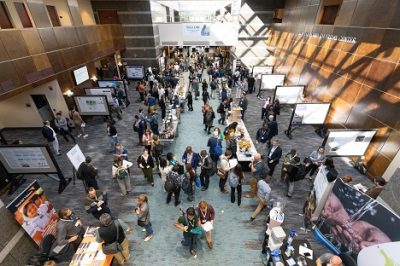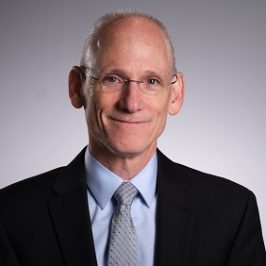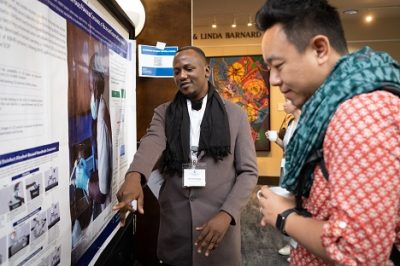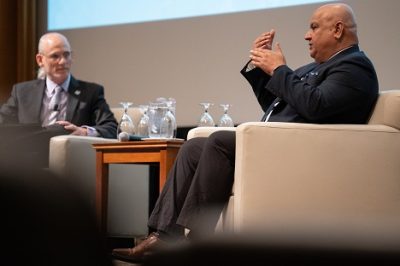UNC Gillings School puts a global focus on water and health
December 1, 2023
Perhaps nothing is more important to health, economic development, and peace and security than water and sanitation. Yet today, more than 2 billion people worldwide live without access to safely managed drinking water and more than 3 billion live without safely managed sanitation services. Each day, around 1,000 children under the age of five die because of unsafe water, sanitation and poor hygiene. Climate change is exacerbating these challenges.

The Water and Health Conference brought participants from around the world to UNC’s Friday Conference Center.
Stepping up to address these challenges, the University of North Carolina at Chapel Hill has positioned itself at the center of the science, policy, and practice nexus to identify new approaches to addressing the world’s drinking water and sanitation challenges.
Each year, the Water Institute at the UNC Gillings School of Global Public Health hosts the UNC Water and Health Conference. Founded in 2009, the Conference has become the world’s largest annual international conference dedicated exclusively to water and health and has been recognized by the United Nations as a mechanism to advance action towards achieving universal access to safe drinking water and sanitation for all (in line with UN Sustainable Development Goals 6.1 and 6.2). To reach these goals, it brings together scientists, practitioners and decision-makers to drive solutions that ensure access to these essential services.

Dr. Aaron Salzberg
“The goal of the conference is to create a safe space where we can collectively interrogate the latest science and evidence to improve policies and practices to achieve universal access to water and sanitation [WASH] services,” said Aaron Salzberg, PhD, Jennifer and Don Holzworth Distinguished Professor and director of the Water Institute. “It’s where science, practice and policy come together.”
The 2023 UNC Water and Health Conference was held October 23–27 at the Friday Conference Center at UNC and was the largest to date. More than 650 attended the Conference in person and more than 1,500 online.
Participants ranged from infrastructure experts and academics to government officials. More than 100 countries were represented, and a large percentage of Conference participants were from low- and middle-income countries (LMICs). A critical component of this success has been the switch to a hybrid format, catalyzed by the COVID-19 pandemic, that has enabled greater attendance from a larger number of countries.

Dean Nancy Messonnier
“The big problems society faces increasingly call for a public health approach, and it’s vital to channel the latest research from academia into real-world solutions,” said Nancy Messonnier, MD, dean and Bryson Distinguished Professor in Public Health at the Gillings School. “One of the ways the Water Institute acknowledges this reality and leads on big solutions is by pulling together expertise from across sectors and around the world at the annual Water and Health Conference.”

Poster session, verbal presentations and panel discussions covered a broad range of WASH topics.
The Conference includes technical sessions, posters, side events, plenaries and workshops. Content is carefully curated and selected based on a double-blinded peer-review process.
Thanks to funding from the Bill & Melinda Gates and Conrad N. Hilton Foundations, travel scholarships are offered to exceptional presenters from LMICs. Many attendees also support and engage in writing workshops and other events specifically developed for young professionals.

In one plenary, Salzberg interviewed Saroj Kumar Jha, global director of water global practice at World Bank.
Plenary sessions in 2023 focused on topics critical across the sector including the future of WASH, accelerating drinking water and sanitation services in fragile environments, addressing power dynamics in the design and implementation of WASH programming and whether and how science and evidence are informing commitments made at the 2023 UN Water Conference.
The Water and Health Conference also serves as an important platform to advance issues of interest to the UNC community. This year’s Conference coincided with National Lead Poisoning Prevention Week. With support from development partners, the Water Institute hosted several events focused on eradicating lead in drinking water including a day-long workshop to support the development of national plans and strategies. Other events encouraged partners to commit to stop the use of lead-leeching pipes and parts in new water systems by 2030 and join the Global Lead-Free Water initiative launched by UNC at the 2023 UN Water Conference.
“Sound science and evidence matter now more than ever, not just from the laboratories of academia, but from the field,” said Salzberg. “Indigenous knowledge; the experience of workers; a better understanding of the behaviors, prejudices and systemic inequalities that impede equality of access, these are the elements that need to inform our work. An environment where we can share these learnings and experiences across the divides of race, culture, history, wealth and opportunity, this is what we think makes this meeting unique.”
Faculty members from the Water Institute and Gillings School played an outsized role in the Conference’s success, including Joe Brown, PhD, PE, Jill Stewart, PhD, Philip C. Singer Distinguished Professor of environmental sciences and engineering (ESE), and Mark D. Sobsey, PhD.
Recordings of the Conference sessions can be found at UNC Water and Health Conference, and findings will be featured in PLOS Water and the Journal of Water, Sanitation & Hygiene for Development. Interested sponsors can contact the Water Institute at waterinstitute@unc.edu.
Contact the UNC Gillings School of Global Public Health communications team at sphcomm@unc.edu.
About the Water Institute — The Water Institute is built around the belief that evidence matters, and that good science should drive both policy and practice. Its goal is to ask the right questions, collect evidence and use that evidence to improve the delivery of services and management of water resources.
Under the direction of Aaron Salzberg, PhD, the Water Institute continues the tradition of excellence in WASH science, implementation and policy. It is recognized globally as a leader in real-world solutions to the most pressing water and sanitation challenges and as a locus of learning, innovation and entrepreneurship that is producing the next generation of leaders in policy, practice and research. By highlighting and solving complex WASH challenges, it is improving the lives of people across N.C. and beyond.
